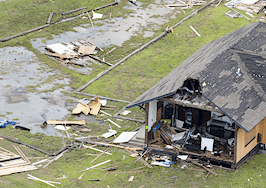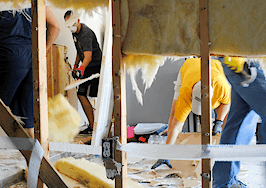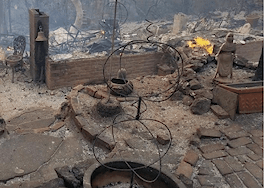One of 2017’s black eyes will be the series of natural disasters that wreaked historic levels of disruption on people, housing and communities, particularly on the vulnerable U.S. coasts.
First a brutal hurricane season brought unprecedented levels of flooding to Houston and hammered Florida and Puerto Rico. In quick succession a firestorm engulfed California’s wine country for more than a week in what’s been called the deadliest wildfire the state’s ever seen.
The real estate community stepped up to assist in the aftermath of these disasters.
Real estate agents in Houston executed boat rescues at the peak of the flooding. In Northern California, an agent urgently knocked on neighbors’ doors to warn them of approaching fires. Brokerage offices became second homes for distressed agents and clients. Regional and national real estate associations offered accessible relief funds for those in need.
Now, as the real estate community wipes its brow for (hopefully) a respite, it’s time for some serious thinking. What’s next? What can the industry learn from these events, and how does it prepare for what could be a challenging 2018 and beyond as climate change threatens to plunge real estate into chaos?
The reality that real estate will face crises again isn’t lost on some of the industry’s major players, and in contemplating the future, they are looking at array of solutions to mitigate damage when disaster strikes and be more prepared to act swiftly when it does.
In addition to its Realtor Relief Foundation, dedicated to providing housing-related assistance to victims of disasters, the National Association of Realtors is considering developing a resource for associations and members to plan for and recover after catastrophes.
Tom Freireich, head of operations of the Keller Williams Disaster Relief Team, could see the real estate industry banding together and assigning roles amid disasters, following the lead of the Red Cross and Salvation Army. The franchisor has been actively involved in relief efforts after the 2011 Joplin, Missouri, tornados.
At that point, Keller Williams’ then-president Mary Tennant decided to be more proactive in helping KW associates during disasters and set up a permanent disaster relief team. The company now has a 10,000 square-foot warehouse with supplies in Austin, Texas, and three branded 18-wheeler trucks. It also recently started disaster relief training courses for its franchise leaders.
“We are all in these events together,” Freireich said. “It’s no longer this brand versus that brand, we’d love to see the other brands emulate or improve what we do.”
In addition to response efforts, another prong of preparation for real estate comes to down to housing planning and sustainability. Ed Wolff, co-chair of the Houston Association of Realtors’ Government Affairs Committee and a three-time Houston flood victim, would like to see a bigger focus on building homes to be more resilient. He is personally raising his house by six feet with future floods in mind.
He’s also acutely aware that two-thirds of homes flooded in Houston were not in flood zones — and that you can’t always trust history.
“We will be proven wrong if we keep looking to the past to determine our future,” Wolff said. “We need to do things in a way that is forward-thinking, intelligent, but resilient.”
When homes do get destroyed — whether it’s in the wake of flooding, wind, earthquakes or fire — rebuilding must come into play. Dan Conn, CEO of Christie’s International Real Estate is looking at companies such as Giveback Homes, an altruistic network of real estate professionals that builds homes across the U.S., Central America and the Caribbean, and non-profit Habitat for Humanity, to partner with on rebuilding in the long-term.
Sotheby’s International Realty also recently announced it has partnered with New Story, a charity that builds communities in the developing world, on rebuilding efforts in Mexico.
For real estate professionals in stricken areas, Conn suggests they offer guidance on what homeowners should be thinking about with a rebuild in light of any new building codes. Over the years, Florida, for example, has changed all the code requirements for new homes to better withstand storms.
“That’s the kind of thinking that goes into rebuilding,” Conn added. “There has to be a viability to [it].”
Exit Realty CEO Tami Bonnell says the role of agents will also include keeping their clients apprised of changes in insurance policies after the recent disasters.
Agents can build a reputation for their knowledge in these areas — they need to be “in tight” with a knowledgeable insurance person, she said.
Some brokerages in more remote parts of the U.S. anticipate having to fend for themselves, at least temporarily, if a disaster were to strike in their neck of the woods, especially in locations outside the U.S. mainland.
The slow recovery on the island of Puerto Rico has hit home for Hawaii Life’s principal broker-owner Matt Beall who says recent events have impacted the Hawaii brokerage’s planning for the future.
“Even prior to these events, we would host periodic ‘black swan’ meetings, where key members of the company would speculate on how we might react to seemingly random or unpredictable events. Everything from tsunamis to terrorists attacks to North Korea to another significant recession usually makes the cut for discussion,” he said.
Beall has come to realize that these extremely severe weather and natural disasters are no longer of the ‘black swan’ variety. Rather, they’re both predictable and historically probable.
“We are looking into a number of different ideas, everything from storing emergency generators and basic survival gear to buying a boat,” Beall said.







